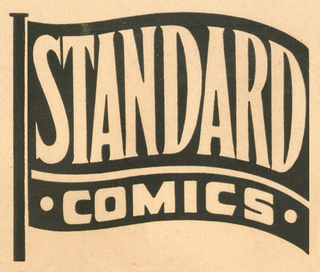Pulp magazines were inexpensive fiction magazines that were published from 1896 until around 1955. The term "pulp" derives from the cheap wood pulp paper on which the magazines were printed due to their cheap nature. In contrast, magazines printed on higher-quality paper were called "glossies" or "slicks". The typical pulp magazine had 128 pages; it was 7 inches (18 cm) wide by 10 inches (25 cm) high, and 0.5 inches (1.3 cm) thick, with ragged, untrimmed edges. Pulps were the successors to the penny dreadfuls, dime novels, and short-fiction magazines of the 19th century.

A paperback book is one with a thick paper or paperboard cover, and often held together with glue rather than stitches or staples. In contrast, hardback (hardcover) books are bound with cardboard covered with cloth, leather, paper, or plastic.

The Spider is an American pulp-magazine hero of the 1930s and 1940s. The character was created by publisher Harry Steeger and written by a variety of authors for 118 monthly issues of The Spider from 1933 to 1943. The Spider sold well during the 1930s, and copies are valued by modern pulp magazine collectors. Pulp magazine historian Ed Hulse has stated "Today, hero-pulp fans value The Spider more than any single-character magazine except for The Shadow and Doc Savage."

Unknown was an American pulp fantasy fiction magazine, published from 1939 to 1943 by Street & Smith, and edited by John W. Campbell. Unknown was a companion to Street & Smith's science fiction pulp, Astounding Science Fiction, which was also edited by Campbell at the time; many authors and illustrators contributed to both magazines. The leading fantasy magazine in the 1930s was Weird Tales, which focused on shock and horror. Campbell wanted to publish a fantasy magazine with more finesse and humor than Weird Tales, and put his plans into action when Eric Frank Russell sent him the manuscript of his novel Sinister Barrier, about aliens who own the human race. Unknown's first issue appeared in March 1939; in addition to Sinister Barrier, it included H. L. Gold's "Trouble With Water", a humorous fantasy about a New Yorker who meets a water gnome. Gold's story was the first of many in Unknown to combine commonplace reality with the fantastic.

Lesbian pulp fiction is a genre of lesbian literature that refers to any mid-20th century paperback novel or pulp magazine with overtly lesbian themes and content. Lesbian pulp fiction was published in the 1950s and 1960s by many of the same paperback publishing houses as other genres of fiction, including westerns, romances, and detective fiction. Because very little other literature was available for and about lesbians at this time, quite often these books were the only reference the public had for modeling what lesbians were. English professor Stephanie Foote commented on the importance of lesbian pulp novels to the lesbian identity prior to the rise of organized feminism: "Pulps have been understood as signs of a secret history of readers, and they have been valued because they have been read. The more they are read, the more they are valued, and the more they are read, the closer the relationship between the very act of circulation and reading and the construction of a lesbian community becomes…. Characters use the reading of novels as a way to understand that they are not alone." Joan Nestle refers to lesbian pulp fiction as “survival literature.” Lesbian pulp fiction provided representation for lesbian identities, brought a surge of awareness to lesbians, and created space for lesbian organizing leading up to Stonewall.
Writer's Digest is an American magazine aimed at beginning and established writers. It contains interviews, market listings, calls for manuscripts, and how-to articles.

Fiction House was an American publisher of pulp magazines and comic books that existed from the 1920s to the 1950s. It was founded by John B. "Jack" Kelly and John W. Glenister. By the late 1930s, the publisher was Thurman T. Scott. Its comics division was best known for its pinup-style good girl art, as epitomized by the company's most popular character, Sheena, Queen of the Jungle.

Street & Smith or Street & Smith Publications, Inc., was a New York City publisher specializing in inexpensive paperbacks and magazines referred to as dime novels and pulp fiction. They also published comic books and sporting yearbooks. Among their many titles was the science fiction pulp magazine Astounding Stories, acquired from Clayton Magazines in 1933, and retained until 1961. Street & Smith was founded in 1855, and was bought out in 1959. The Street & Smith headquarters were at 79 Seventh Avenue in Manhattan; they were designed by Henry F. Kilburn.

Martin Goodman was an American publisher of pulp magazines, digest sized magazines, paperback books, men's adventure magazines, and comic books, who founded the comics magazine company Timely Comics in 1939. Timely Comics would go on to become Marvel Comics, one of the United States' two largest comic book publishers along with rival DC Comics.
Robert Edward Weinberg was an American author, editor, publisher, and collector of science fiction. His work spans several genres including non-fiction, science fiction, horror, and comic books.

Blue Book was a popular 20th-century American magazine with a lengthy 70-year run under various titles from 1905 to 1975. It was a sibling magazine to The Red Book Magazine and The Green Book Magazine.

The Green Lama is a fictional pulp magazine hero of the 1940s, created by American author Kendell Foster Crossen. He is commonly portrayed as a powerful Buddhist Lama, dressing in green robes with a red scarf and using his powerful skill set to fight crime. Slightly different versions of the same character also appeared in comic books and on the radio. Unlike many contemporary characters from smaller publishers, the Green Lama character is not in the public domain, as the author "wisely retained all rights to his creation".

Gay pulp fiction, or gay pulps, refers to printed works, primarily fiction, that include references to male homosexuality, specifically male gay sex, and that are cheaply produced, typically in paperback books made of wood pulp paper; lesbian pulp fiction is similar work about women. Michael Bronski, the editor of an anthology of gay pulp writing, notes in his introduction, "Gay pulp is not an exact term, and it is used somewhat loosely to refer to a variety of books that had very different origins and markets". People often use the term to refer to the "classic" gay pulps that were produced before about 1970, but it may also be used to refer to the gay erotica or pornography in paperback book or digest magazine form produced since that date.

Standard Comics was a comic book imprint of American publisher Ned Pines, who also published pulp magazines and paperback books. Standard in turn was the parent company of two comic-book lines: Better Publications and Nedor Publishing. Collectors and historians sometimes refer to them collectively as "Standard/Better/Nedor".

Harold Brainerd Hersey was an American pulp editor and publisher, publishing several volumes of poetry. His pulp industry observations were published in hardback as Pulpwood Editor (1937).
The Raven is a fictional superhero character who first appeared in the Ace Comics title Sure-Fire Comics. He is based on the pulp hero "The Moon Man" published by Periodic House, the pulp publisher connected to Ace Comics.
Soda pulping is a chemical process for making wood pulp with sodium hydroxide as the cooking chemical. In the Soda-AQ process, anthraquinone (AQ) may be used as a pulping additive to decrease the carbohydrate degradation. The soda process gives pulp with lower tear strength than other chemical pulping processes, but has still limited use for easily pulped materials like straw and some hardwoods.
Arsenal Pulp Press is a Canadian independent book publishing company, based in Vancouver, British Columbia. The company publishes a broad range of titles in both fiction and non-fiction, focusing primarily on underrepresented genres such as underground literature, LGBT literature, multiracial literature, graphic novels, visual arts, progressive and activist non-fiction and works in translation, and is noted for founding the annual Three-Day Novel Contest.

Son Of Retro Pulp Tales is a collection of short fiction edited by Joe R. Lansdale and his son Keith Lansdale. Continuing in the same vein as the earlier book titled Retro Pulp Tales, these stories are more in the tradition of early pulp stories in cheap magazines and pre-1960s horror films. This book was published exclusively by Subterranean Press.

Dead on the Bones: Pulp on Fire is a collection of novellas and short stories written by American author Joe R. Lansdale. He dedicated this work to his major influences of his youth: Edgar Rice Burroughs and Robert E. Howard. All the stories were written by Lansdale. This book was also dedicated to longtime collaborator artist Timothy Truman and is limited to 1500 copies published by Subterranean Press of Burton, Michigan. It's also available as a Kindle E-Book.













